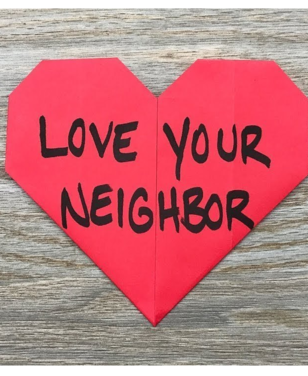Now more than ever, we live in a world where news headlines and cycles are dominated by war, death, violence, and political and ideological division. Even in the US — an erstwhile world leader and superpower — gun violence and hate crimes are at an all-time high. Lawn signs and bumper stickers are like angry snakes, spitting the venom of our zero-sum differences. We’re more motivated by labels and “winning” arguments and elections than by looking out for one another, walking a mile in each other’s shoes, or working toward goals that benefit us all.
In short, as Christians and as world citizens, many of us often forget the second greatest commandment Christ gave us: to “love thy neighbor as thyself” (Matthew 22:34). As Valentine's Day approaches, it's vital to remember that love isn't just about romantic relationships. It's about the broader human connections we share with our local and world “neighbors,” and what we owe to each other as fellow human beings.
But how can you love your neighbor as yourself? How should we approach love as a Christian principle? As with so many other questions, the Bible is an excellent resource. Here’s how to get started.
What Does the Bible Say About Love? And Who Are Our Neighbors?
One of the most important things the Bible teaches about love is that it’s a way of modeling godly behavior and honoring God at the same time. When asked what the greatest commandment is, Jesus said: “‘Love the Lord your God with all your heart and with all your soul and with all your mind.’ This is the first and greatest commandment. And the second is like it: ‘Love your neighbor as yourself.’ All the Law and the Prophets hang on these two commandments.”
So far, so good. It’s clear enough that love is the most important starting point for being a follower of Christ.
What love means in this context is often less clear. Here, it can be helpful to know that the New Testament was first written in Greek, and in this context, the word for love is “agapē.” This word is often defined as benevolence, unconditional love, or sacrificial love; it’s the love of God for His people, and vice versa. Regardless of translation, however, 1 Corinthians 13:4-5 plainly explains that “Love is patient, love is kind. It does not envy, it does not boast, it is not proud. It does not dishonor others, it is not self-seeking, it is not easily angered, it keeps no record of wrongs.”
In other words, we should, at a minimum, prioritize the basic welfare of our neighbors. But who exactly counts as our neighbors? In both an Old Testament and New Testament context, “neighbors” commonly referred both to fellow Israelites and to resident foreigners in the community, but sometimes also to strangers in need of help, as the story of the Good Samaritan in Luke 10:29-37 illustrates.
In short, the Bible calls on us to be benevolent and caring toward more or less anyone we live near or encounter in our lives, not just those in our inner circle, political party, culture, or religion. In addition, loving our neighbors doesn’t just make us good Christians; it can save lives, prevent tragedy and heartbreak, and go a long way toward stitching society back together.
So, the next step is to decide how we can demonstrate this key principle of our faith.
Ways to Show Love for Your Neighbor
Here are some ways you can show love for the people in your community and beyond (and be an agent of peace in society):
Active listening. One of the most profound ways to show love is by actively listening. This means being present, avoiding interruptions, and seeking to understand rather than to be understood. Be a whole, empathetic, and curious human, not a flag or a bumper sticker.
Acts of service. Small gestures can make a significant impact. Consider volunteering at a local shelter, donating to a cause, or simply helping a neighbor with their groceries.
Building bridges. Engage in interfaith or intercultural dialogues. These platforms provide opportunities to learn, dispel myths, and foster mutual respect.
Educating yourself. Take the time to educate yourself about global events, the experiences of marginalized communities, and the challenges faced by your neighbors. If you use objective and reliable sources, knowledge can be a powerful tool in combating prejudice and ignorance.
Prayer and reflection. Prayer can be a potent means of expressing love and seeking guidance on how to better serve others.
Promoting peace. In a world rife with conflict, promoting peace in your community can be a powerful act of love. This could mean organizing community events, participating in peace marches, or supporting organizations that work to unify diverse or divergent groups.
This Valentine's Day, let's remember that our love for others should extend beyond those closest to us. We can do this by showing compassion, kindness, and understanding to everyone around us. Now as never before, love is not just a nicety; it's a necessity.
Experience the Meaning of Love With Word of Life Church
Word of Life Church is dedicated to making the world a better place by spreading the Word and Love of God. Our mission is to create an authentic, welcoming worship community, and to empower people to live a life of faith and service in the name of Jesus — including learning to love our neighbors.
Our church offerings include a variety of worship experiences, LifeGroups, youth programs, and service initiatives for individuals of all ages, all of them designed to offer community and opportunities to engage with God. However, we can’t do God’s work without you. Please consider supporting us by donating today!
